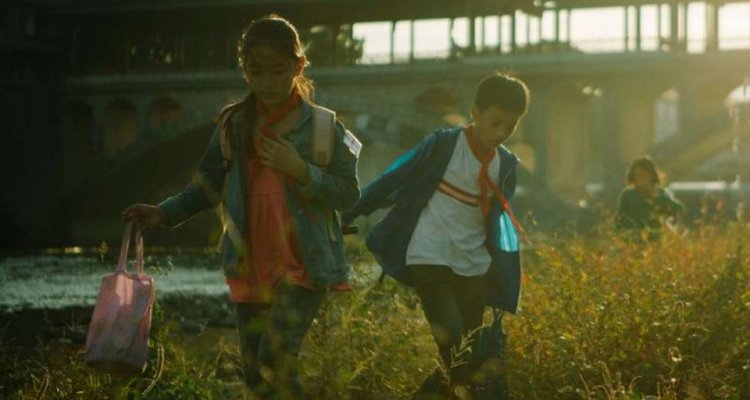A team of engineers stands below a bridge. Shadows from moving train cars – also being reflected inside a frame within a frame – scurry across the dirt. The camera zooms in and out, panning between them, completely uninterested in masking the motion or change in depth, as they adjust their tripod, taking calculated measurements. 360 panoramic shots circle around them; its detached camera movement initially seems unconcerned with immersion or illusion. “Guess with your eyes,” someone suggests. There’s arguably too much to digest in only one viewing of Chinese director Qiu Sheng’s spellbinding cinematic arrival, “Suburban Birds,” but patient and pensive viewers – specifically, slow-cinema aficionados – should discover an expressly unique coming-of-age fable that feels like an arthouse “Stand By Me,” doubling as a cultural fever dream.
Structured uniquely with two narratives – one sort of being sandwiched between the bookends of the other – each shot in a distinct style, it’s difficult to dive into ‘Birds’ story without running the risk of ruining much of its magic. The first portion follows the team brought in to investigate a series of craters that have resulted in the collapse of various suburban structures, with a skyscraper window washer presenting a supernatural theory regarding the sinkholes. There was a dragon vein beneath the road that an Emperor of the Sang Dynasty once traveled upon, the vein was cut when men started to dig beneath the earth. Is the city repenting for this, or something else maybe?
Our second plotline tracks a group of playful younglings, still innocent enough that covering a bald spot from a botched haircut is the worst of their worries (at least, on the outset). Walking through the woods beside a rushing creek, the kids knock a bird’s nest out of a tree. A young boy, Xia Hao (Zihan Gong), takes the fallen egg home; rolling it around on his desk while playing with toy dinosaurs, he prays, “Make my monster grow.”
Despite initially seeming disconnected from one another, the symbolic overlap between the two stories in ‘Birds’ expands. There are clear coded similarities, yet also key differences between the narratives. Mason Lee plays the lead of the first section, who appears to be a grown-up incarnation of Xia Hao, but that’s where things start to get complicated and the film’s dreamy consciousness takes hold.
One of the most mesmerizing elements of the structure is how it ends up satisfying viewer curiosity, and much of this is accomplished with distinguishable imagery. The cinematography during the engineer segments is far removed and somewhat industrial (the quick pans and extreme zooms evoking a similar vibe to Hong Sang-soo’s trademark style). The other narrative is full of warm, sweeping Steadicam shots. Colors are more saturated, and the aesthetic more naturalistic. These accentuated choices continually reveal a method to their madness. It’s quite rare to see the “iris shot” used these days, but Qiu Sheng implements it effectively, where the stories’ styles begin to intersect.
Casual audiences might describe the film’s pace to an elevator moving too slowly. Much like Hu Bo’s tragic masterpiece, “An Elephant Sitting Still,” this is most certainly a work of “slow cinema.” The work uses withholding as a deliberate device. It’s often as tantalizing as it wants it to be and respectfully restrained on other occasions. When a character drops a pair of binoculars into the tall grass beside a riverbank, flashes of extreme color foreshadowing its inevitable impact. These aesthetic outliers are rare, but they work because they are specific and not over-used. There comes a point when the film flips its vantage, and it becomes clear that the piece is so full of ideas you cannot possibly ingest them all on their first go-around.
In the spirit of a director like the late Abbas Kiarostami, the parallel segments serves as both poetry and commentary, and the movie confidently explores so many themes using simple expressive devices; the repercussions of a large bottle of water spilling down a staircase, the image of an aircraft vehicle fenced off in a public park like a monument, exploring jealous affection as a dog barks at a girl singing its puppy a lullaby. This is the kind of first feature that gets you energized for whatever the new filmmaker has in store for audiences next. ‘Birds’ is far from perfect, and occasionally frustrating, but delicate and precise in its creative decision-making. It’s the kind of movie you sit on, but then can’t wait to revisit. “Suburban Birds” is a rewarding and revelatory first feature from a fresh artistic voice. [B+]

